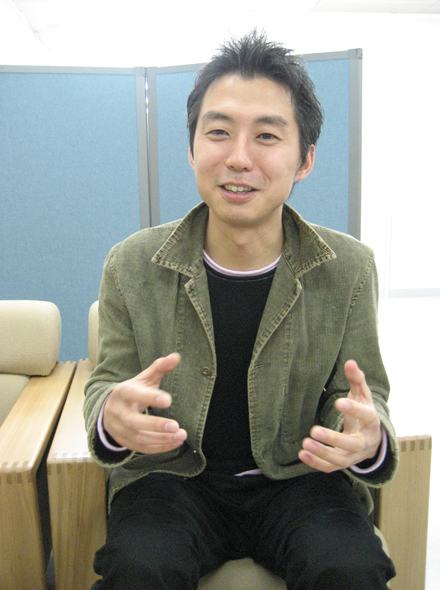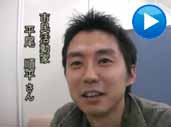Planning peace activities for all
Jan. 3, 2008
by Miho Kuwajima, Staff Writer
Jumpei Hirao, 31, is a citizen activist, the leader of an organization called “from grassroots Hiroshima.”
“Peace involves everyone,” says Jumpei Hirao. “I want to create a passion for peace in young people in Hiroshima.” After leaving the Japan International Cooperation Center (JICE) in March 2007, where he had worked for seven years, Mr. Hirao has been engaged in peace activities in the Hiroshima area. “from grassroots Hiroshima,” the group he founded, boasts 40 members in their teens, 20s, and 30s. “The location of our meetings isn't so important,” he explained. “Coffee shops are fine. I just want to create opportunities in Hiroshima where young people can talk about peace as a natural part of their lives.” Currently, group members are holding study sessions to prepare for the G8 Summit of the Lower House Speakers to be held in Hiroshima in September. Mr. Hirao seems to relish his role of stirring enthusiasm for peace in the younger generation.
What inspired you to become involved in peace activities?
Between May and December 1998, I took some time off from college and traveled as a backpacker through 15 countries in Asia, the Middle East, and Eastern Europe. Wherever I went, when I said I was from Hiroshima, I was amazed that everyone knew the name. Although I knew Hiroshima was widely-known in the world, these personal experiences impressed this fact upon me strongly. At the same time, I was peppered with questions like “Is there still radiation?” and “Can people live there now?” Although the historical Hiroshima, as the first city to suffer an atomic bombing, is familiar to everyone, people are hardly aware of present-day Hiroshima. Their knowledge is limited to the Hiroshima of 62 years ago. So I came to feel that I wanted the world to understand that, based on this history, Hiroshima now appeals for peace.
I understand that you were born and raised in Hiroshima. What influence has this had on you?
When I was a child in elementary school and junior high school in the 1980s, peace education back then focused mainly on listening to the horrific consequences of the bombing and this was quite frightening. As a child, I was so terrified I thought I would never visit Peace Memorial Museum again, particularly as the previous exhibits were so scary. Though I certainly understand the need to convey the horror of the atomic bombing, I believe that stressing only that aspect turns people away from the subject.
My grandmother is an A-bomb survivor. She entered the city within two weeks of the bombing and, as a result, was exposed to radiation. Since she was pregnant at the time, one of my parents is also a hibakusha. But I never heard my grandmother's personal experience of the bombing and she passed away three years ago.
Our generation is probably the last one that will have an opportunity to come into direct contact with hibakusha. This is why, since I've had the chance to hear the stories of the survivors in their own words, I want to serve as a bridge between the past and the future.
What do you think of “grassroots” power?
When I was traveling through Pakistan for a month, Pakistan and India conducted nuclear tests. When the Pakistani people at my lodgings found out I was from Hiroshima, they asked me a lot of questions. At the state level, the confrontation between India and Pakistan has been deep-seated, but the Pakistanis I met complained and told me such things as “Nuclear weapons should never be used” and “We don't want war with India.”
Also, when I was working for JICE, I was involved in developing human resources. I went to countries like Kyrgyzstan and Uzbekistan several times for a couple of months. Every project was the fruit of human connections. So I believe that the collective power of individuals can transcend the framework of nations.
What activities are you planning for the future?
Peace activities should be something that anyone can take part in, not just particular organizations or groups of people. My hope is that I can prompt as many people as possible to join together for peace activities and encourage them to dream about peace from a smaller to a larger scale. In 2007, we organized a peace rally on October 2nd, the International Day of Nonviolence, sponsored a screening of “An Inconvenient Truth,” and held an Eco Exhibition. In 2008, “from grassroots Hiroshima” will hold another Eco Exhibition and get involved in activities for the G8 Summit of the Lower House Speakers to be held in Hiroshima this September. Our members are now taking part in study sessions to prepare for this event.
Jumpei Hirao, 31, is a citizen activist, the leader of an organization called “from grassroots Hiroshima.”
“Peace involves everyone,” says Jumpei Hirao. “I want to create a passion for peace in young people in Hiroshima.” After leaving the Japan International Cooperation Center (JICE) in March 2007, where he had worked for seven years, Mr. Hirao has been engaged in peace activities in the Hiroshima area. “from grassroots Hiroshima,” the group he founded, boasts 40 members in their teens, 20s, and 30s. “The location of our meetings isn't so important,” he explained. “Coffee shops are fine. I just want to create opportunities in Hiroshima where young people can talk about peace as a natural part of their lives.” Currently, group members are holding study sessions to prepare for the G8 Summit of the Lower House Speakers to be held in Hiroshima in September. Mr. Hirao seems to relish his role of stirring enthusiasm for peace in the younger generation.
What inspired you to become involved in peace activities?
Between May and December 1998, I took some time off from college and traveled as a backpacker through 15 countries in Asia, the Middle East, and Eastern Europe. Wherever I went, when I said I was from Hiroshima, I was amazed that everyone knew the name. Although I knew Hiroshima was widely-known in the world, these personal experiences impressed this fact upon me strongly. At the same time, I was peppered with questions like “Is there still radiation?” and “Can people live there now?” Although the historical Hiroshima, as the first city to suffer an atomic bombing, is familiar to everyone, people are hardly aware of present-day Hiroshima. Their knowledge is limited to the Hiroshima of 62 years ago. So I came to feel that I wanted the world to understand that, based on this history, Hiroshima now appeals for peace.
I understand that you were born and raised in Hiroshima. What influence has this had on you?
When I was a child in elementary school and junior high school in the 1980s, peace education back then focused mainly on listening to the horrific consequences of the bombing and this was quite frightening. As a child, I was so terrified I thought I would never visit Peace Memorial Museum again, particularly as the previous exhibits were so scary. Though I certainly understand the need to convey the horror of the atomic bombing, I believe that stressing only that aspect turns people away from the subject.
My grandmother is an A-bomb survivor. She entered the city within two weeks of the bombing and, as a result, was exposed to radiation. Since she was pregnant at the time, one of my parents is also a hibakusha. But I never heard my grandmother's personal experience of the bombing and she passed away three years ago.
Our generation is probably the last one that will have an opportunity to come into direct contact with hibakusha. This is why, since I've had the chance to hear the stories of the survivors in their own words, I want to serve as a bridge between the past and the future.
What do you think of “grassroots” power?
When I was traveling through Pakistan for a month, Pakistan and India conducted nuclear tests. When the Pakistani people at my lodgings found out I was from Hiroshima, they asked me a lot of questions. At the state level, the confrontation between India and Pakistan has been deep-seated, but the Pakistanis I met complained and told me such things as “Nuclear weapons should never be used” and “We don't want war with India.”
Also, when I was working for JICE, I was involved in developing human resources. I went to countries like Kyrgyzstan and Uzbekistan several times for a couple of months. Every project was the fruit of human connections. So I believe that the collective power of individuals can transcend the framework of nations.
What activities are you planning for the future?
Peace activities should be something that anyone can take part in, not just particular organizations or groups of people. My hope is that I can prompt as many people as possible to join together for peace activities and encourage them to dream about peace from a smaller to a larger scale. In 2007, we organized a peace rally on October 2nd, the International Day of Nonviolence, sponsored a screening of “An Inconvenient Truth,” and held an Eco Exhibition. In 2008, “from grassroots Hiroshima” will hold another Eco Exhibition and get involved in activities for the G8 Summit of the Lower House Speakers to be held in Hiroshima this September. Our members are now taking part in study sessions to prepare for this event.









